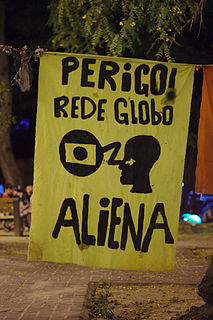
The Workers' Party is a political party in Brazil. Some scholars classify its ideology in the 21st century as social democracy, with the party shifting from a broadly socialist ideology in the 1990s. Founded in 1980, PT governed at the federal level in a coalition government with several other parties from 1 January 2003 to 31 August 2016. After the 2002 parliamentary election, PT became the largest party in the Chamber of Deputies and the largest in the Federal Senate for the first time With the highest approval rating in the history of the country, former President Luiz Inácio Lula da Silva is PT's most prominent member. His successor Dilma Rousseff, also a member of PT, took office on 1 January 2011 and was impeached in 2016.

Maria Lucélia dos Santos is a Brazilian actress, director and producer. She received international acclaim for her leading role in the 1976 Rede Globo telenovela Isaura, The Slave Girl, broadcast in over 80 countries.

Luiz Gushiken was a Brazilian union leader and politician. He was formerly the head of the social communication office of Luiz Inácio Lula da Silva's administration, a position which carried a ministerial rank. He was a second-generation Japanese-Brazilian, with Ryukyuan parents from Okinawa.

Rede Manchete was a Brazilian television network that was founded in Rio de Janeiro on 5 June 1983 by the Ukrainian-Brazilian journalist and businessman Adolpho Bloch. The network remained on the air until 10 May 1999. It was part of Grupo Bloch, which published the magazine Manchete by Bloch Editores, its publishing division; the television network was named after the magazine.

RedeTV! is a Brazilian television network owned by Amilcare Dallevo and Marcelo de Carvalho. It is the newest television network, among the five major networks in Brazil, being a relaunch of Rede Manchete in 1999.

Rede Tupi was a Brazilian television network free-to-air. Its parent broadcaster, located in the city of São Paulo, was the first TV station to operate in the country, being inaugurated on 18 September 1950 by journalist Assis Chateaubriand. He belonged to Diários Associados, one of the largest media conglomerates of the 20th century, owner of several newspapers, magazines, and radio. The channel was formed in the 1970s, with members as co-brothers of the Diários Associados and affiliates. The generating stations were TV Tupi São Paulo and TV Tupi Rio de Janeiro. Due to a history of management problems, which resulted in a financial crisis, Tupi had part of its concessions revoked by the Government of Brazil in July 1980, extinguishing the network.

Television in Brazil has grown significantly since the first broadcasts in 1950, becoming one of largest and most productive commercial television systems in the world. Its biggest network, TV Globo, is the second largest commercial network in South America, and is one of the largest television exporters around the world, particularly of telenovelas, having become popular in many countries. There are 14 free-to-air television networks, as well as satellite channels broadcasting throughout the country.

Lula, Son of Brazil is a 2009 biographical Brazilian film based on the early life of former Brazilian president Luiz Inácio Lula da Silva. Directed by Fábio Barreto, the film was released on January 1, 2010. Upon its release, Lula, Son of Brazil was the most expensive Brazilian film ever, with a budget of over 17 million reais, being later surpassed by Nosso Lar. On September 23, 2010, the film was unanimously chosen by a Ministry of Culture commission as Brazil's submission to the 83rd Academy Award for Best Foreign Language Film, despite not having been chosen to compete.
The Empresa Brasil de Comunicação is a Brazilian public company, created in 2007 to manage the federal government's broadcast network, TV Brasil.

Rede Excelsior was a Brazilian television network founded by Mário Wallace Simonsen on July 9, 1960, in São Paulo, São Paulo. Its last broadcast happened on September 30, 1970, when the Brazilian military dictatorship put an abrupt end to it.

Osasco is a municipality in São Paulo State, Brazil, located in the Greater São Paulo and ranking 5th in population among São Paulo municipalities. According to the IBGE 2015, Osasco currently has the 9th highest gross domestic product in Brazil, and the 2nd largest in the State of São Paulo. The population is 699,944 in an area of 64.95 km2. It is among the world's more dense cities, similar in density to Tokyo and New York City. It's considered the major urban centre of the Western portion of the Greater São Paulo. It used to be a district of São Paulo City until February 19, 1962, when Osasco became a municipality of its own. The city motto is "Urbs labor", a Latin phrase that means "City work".
Agência Brasil (ABr.) is the national public news agency, run by the Brazilian government. The agency was founded in 1990 and it's part of the public media corporation Empresa Brasil de Comunicação (EBC), created in 2007 to unite two government media enterprises Radiobrás and TVE. It is publishing contents under CC-BY.

Danilo Gentili Jr. is a Brazilian comedian, television host, writer, cartoonist, and businessman and political commentator.

Criticism of TV Globo refers to the extensive history of controversies involving the Brazilian television network, which has an unparalleled ability to influence Brazil's culture and shape the country's public opinion. The owners of Rede Globo had enriched themselves with government favors to become billionaires.
Grupo Bloch, also known as Empresas Bloch, is a Brazilian media conglomerate, founded by Ukrainian businessman Adolpho Bloch's family after their arrival in Rio de Janeiro in 1922, when they created Joseph Bloch & Filhos company. The company, which published pamphlets and other printed material, also started to print magazines. Thus, in 1953, the company launched Manchete magazine. With its successful launch, the publishing division of Bloch Editores was established.

The 2017 Brazilian general strike took place on April 28, 100 years after Brazil's first general strike in June 1917. The movement was a protest against reforms of labor laws, which were later adopted and social security proposed by Michel Temer government and pending in National Congress of Brazil.
The 2022 São Paulo state election are taking place in the state of São Paulo, Brazil on 2 October 2022 and 30 October 2022. Voters will elect a Governor, Vice Governor, one Senator, 70 representatives for the Chamber of Deputies, and 94 Legislative Assembly members. The incumbent Governor, Rodrigo Garcia, of the Brazilian Social Democracy Party (PSDB), is eligible for a second term and will run for reelection.
Paulo Stein was a Brazilian journalist, broadcaster, television presenter and sports announcer.

Paulo de Mello Bastos was a former leader of the National Union of Aeronauts, a former leader of the General Workers Command and a former Varig pilot whose resignation in 1963 inspired a general strike in the country.














